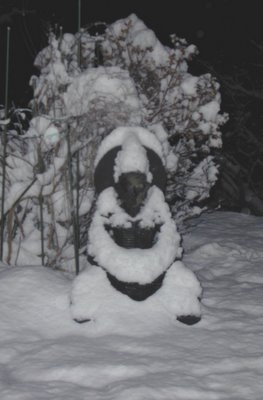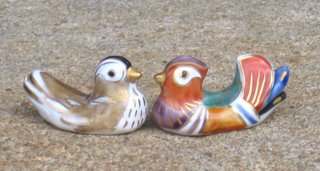More Haiku from February 2006
:::::::::::::::::::::::::::::::::::::::::::::::::::::::::::::::::::::::::::::::::::::::::::::::::::::
A present from © Geert Verbeke
WEBSITE: http://users.skynet.be/geert.verbeke.bowls
BLOG: http://haikugeert.skynetblogs.be/
:::::::::::::::::::::::::::::::::::::::::::::::::::::::::::::::::::::::::::::::::::::::::::::::::::::
雪の夜に 座り続くや 石仏
Tensaku from Susumu Takiguchi
Samui desune. Your new haiku has made me shiver!
Your new haiku is excellent as a poem and in my opinion will compare well with fine haiku written by Japanese masters. Everything about it is pure (WHChaikuneoclassical) haiku.
My TENSAKU, therefore, will be merely cosmetic. Firstly, let us give it an English version for those who don't speak Japanese:
snowy night...
just carries on sitting,
the stone Buddha
Generally, I do not value so high all those haiku written by Western poets which mobilise certain obvious Japanese objects rather like stage props in the presumed belief that anything exotic and Japanese-sounding might make the haiku read more genuine: e.g. kimono, origami, toro, and most frequently Buddha. Other things such as wind chime (though there are Western wind chimes as well) can also be a bit irksome.
It is greatly due to perception gaps and to my intense dislike of stereo-typed and too easy way to which certain people are prone. It is probably Western taste for exoticism only to be enjoyed among Western poets alone. It is high time, however, some Western poets left the 19th century exotic views of Japan behind and started to acquire genuine knowledge and experience of things Japanese.
Your case, however, is totally different and that is why it moves me. For you, it is not something exotic in a far-away foreign country as you live in Japan. As it is written in Japanese it is also most obviously not for foreign consumption. However, more fundamentally and profoundly you live among Buddha statutes, Buddhist temples and Buddhist monks. Moreover, you are an expert of Buddhism. Your perception about them is the same as that of the Japanese, and, most probably stronger.
The first point of my TENSAKU is about the joshi (particle) 'ni' in jogo (the first five beats). Opinion will differ on this point and I welcome comments from other Japanese members here. 'Mo' (meaning 'too') might be better here than 'ni', as it helps express what you want to say more naturally. Thus:
yuki no yo mo
suwari tsuzuku ya
ishibotoke
Some Japanese haijin are bound to disagree with me here, saying that 'mo' could be laying it too thick and 'ni' makes it more sukkiri.
The next point of my TENSAKU is the verb 'tsuzuku' (continue) in chu-shichi (the middle seven beats). You are using the verb as yon-dan and it is here used as rentai-kei (tsuzuku). You are using 'ya' as a kireji which represents eitan and kando. It may be better to use the verb in shimo-nidan, in which case the rentai-kei would be 'tsuzukuru'. This is an equivalent of kogo (modern Japanese) 'tsuzukeru' and 'suwari tsuzukeru' is the usual kogo expression, which I presume comes from the shimo-nidan 'tsuzukuru'. Thus:
yuki no yo mo
suwari tsuzukuru ya
ishibotoke
This is obviously 'ji-amari' (excessive beats) in chu-schichi, counting 8 beats rather than 7. However, it is a Basho-like ji-amari and intensifies the feeling of the act of the stone Buddha's sitting going on and on and on.
The other point about it is that your 'tsuzuku ya' could be interpreted as what is called han-go (i.e. irony), which would mean, 'Would the stone Buddha continue to sit in the night snow? No, it wouldn't.' So, the meaning would be very different.
However, these are very much of finer points and the argument of advanced stage of haiku-writing. You might ask your Japanese haiku masters for their opinion. I know at least they will praise this haiku very highly, at least as highly as I do.
Yoku dekimashita!
With very best wishes and kengin,
Susumu
ooo ooo ooo
Dear Susumu
Thank you so much for your tensaku. I will rewirte it using the MO, I like that idea.
By the way
the one sitting in the cold snowy night on the veranda watching the Buddha, who might that be? I go for the irony with the YA.
yuki no yo mo
suwari tsuzuku ya
ishibotoke
Let us hope for better weather!
Buddha is indeed a part of my daily reality and not anything exotic.
This particular stone statue is from Gandhara, India, so he is a real gaijin like myself. I have written more about him HERE.
GABI
ooo ooo ooo
Quote from another friend:
Dear Gabi,
Mister Susumu wrote he does not value so high all those haiku written by Western poets which mobilise certain obvious Japanese objects: e.g. most frequently the Buddha.
Correction:
the Buddha is nowedays a part of the Western culture too. This spritual master has nothing to do with a 19th century taste for exoticism of Japan.
He is part of our everyday reality.
G.
***************************
Please send me your contributions
To the Daruma Museum Index
To the WHC Worldkigo Database










7 comments:
brrrrrrr looks cold gabi san, thank you for the snow pictures.
We have just started autumn and we had snow on our mountain last night
!!! back hot again tomorrow.
Ron from Tasmania
::::::::::::::::::::::::::::::::::::::::::::::::::::::::::::::::::::::
night snow -
even without moonlight
it dazzles
Dina E. Cox
(in Canada where we had the mildest January in 100 years... but still, snow)
:::::::::::::::::::::::::::::::::::
aloha from the land of
sun sun sun
a golden circle
I love your words...
I do love snow we have some on top of the mountain but its very hard like the lava rock.. not soft and fluffy and pure as ice cream..
shanna
:::::::::::::::::::::::::::::::::::
Thank you, my friends from WHCworkshop!
GABI
::::::::::::::::::::::::::::::::::::::::::::::::::::::::::::::::::::::
Dear Gabi san
Please be careful in the white slippery slops of the mountain.
I hope the roads will clear. Spring is on the way!!
ai... chibi
a pinecone drops among grass flowers --
the sound of wind
Gabi,
Your "cold and snow …". Is simply superb!
Love From India
::::::::::::::::::::::::::::::::::
And I've enjoyed your snow postings too ...
L.
::::::::::::::::::::::::::::::::::::::::::::::::::::::::::::::::::::::
hi gabi,
you have lived a very good haiku:
in the snowy night
just sitting -
Stone Buddha
it is deeply felt.
i also like that you include your haiku in japanese and german. that makes "your" art "you"!
love,
b'oki.
bette wappner
:::::::::::::::::::::::::::::::::::::::::::::::::::::::::::::::::::
old stone basin -
some snowflakes sprinkled
on thin ice
::::::::::::::::::::::::::::::::::::::::::::::::::::::::::::::::::::::
like floating in the sky reflected in the morning sun today ...
cold March 2007 !
::::::::::::::::::::::::::::::::::::::::::::::::::::::::::::::::::::::
Post a Comment